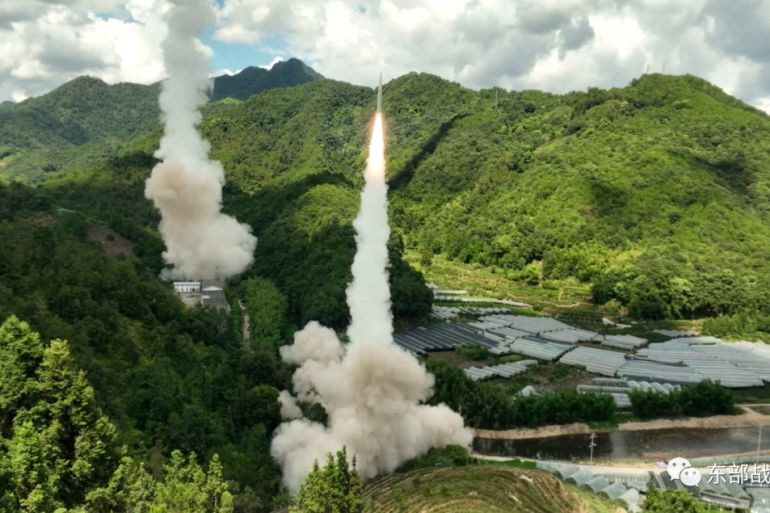‘Highly provocative’: China military drills resume around Taiwan
Taiwan says monitoring situation after multiple Chinese ships and aircraft crossed median line in Taiwan Strait on Friday.

China has resumed its largest-ever military exercises in the waters around the self-ruled island of Taiwan, with the territory’s defence ministry saying numerous warships and fighter aircraft had crossed the Taiwan Strait’s median line.
The exercises, which on Thursday included firing ballistic missiles and deploying fighter jets, follow the visit of US House Speaker Nancy Pelosi to the democratic island, which Beijing claims as its own.
Recommended Stories
list of 4 items- list 1 of 4Flights cancelled, rerouted over China’s drills near Taiwan
- list 2 of 4Chinese missiles suspected of landing in Japan’s economic zone
- list 3 of 4Will China and the US avert a showdown over Taiwan?
- list 4 of 4Is China preparing to invade Taiwan? Key questions answered
Taiwan’s defence ministry said that multiple Chinese “warships and warplanes” had conducted exercises in the Taiwan Strait as of 11am (03:00 GMT) on Friday, crossing the median line of the waterway that separates China and Taiwan.
The ministry said China’s military activities were “highly provocative” and that it was monitoring the “enemy situation” closely.
US Secretary of State Antony Blinken condemned the military exercises – which also included firing missiles into Japan’s exclusive economic zone – as a “significant escalation”.
“China has chosen to overreact and use Speaker Pelosi’s visit as a pretext to increase provocative military activity in and around the Taiwan Strait,” Blinken said at a news conference following a meeting of Southeast Asian foreign ministers in the Cambodian capital of Phnom Penh on Friday.
“The fact is, the speaker’s visit was peaceful. There is no justification for this extreme, disproportionate and escalatory military response.”
Blinken said this week’s stand-off was Beijing’s latest attempt to alter the fragile status quo over self-ruled Taiwan, which China’s ruling Communist Party regards as part of its territory to be recovered, by force if necessary.
The secretary of state also said the US stands in “strong solidarity” with Japan and would “not be provoked” by China’s actions.
Live-fire exercises
Thursday’s drills involved a “conventional missile firepower assault” in waters to the east of Taiwan, the Chinese military said.
Beijing’s state-run Xinhua news agency reported the Chinese army “flew more than 100 warplanes including fighters and bombers” during the exercises, as well as “over 10 destroyers and frigates”.
State broadcaster CCTV and the Communist Party’s tabloid Global Times reported that Chinese missiles had flown over the island, with the Global Times claiming the drills had “completely locked down” the island.
Taiwan said the Chinese military fired 11 Dongfeng-class ballistic missiles “in several batches”.
It said the missiles were high in the atmosphere and constituted no threat but did not give details of their flight paths, citing intelligence concerns.
Taiwan Premier Su Tseng-chang accused China of destroying the world’s most frequently used waterway with military exercises, referring to the country as the “evil neighbour” when reporters asked about the missile launches on Friday.
Asian airlines, including Singapore Airlines and Korean Air, re-routed or cancelled flights on Friday because of China’s continuing military activity.
Tense mood at ASEAN meeting
Japan launched a diplomatic protest after announcing that five of nine missiles fired towards its territory had landed in its exclusive economic zone (EEZ), while China summoned the Japanese ambassador over Japan’s participation in a G7 statement condemning the military drills.
China later cancelled plans to meet Japanese officials on the sidelines of a meeting of Southeast Asian foreign ministers in Cambodia, and while top diplomat Wang Yi greeted Russia’s Foreign Minister Sergey Lavrov with a tap on the shoulder, he appeared to ignore his Japanese counterpart Yoshimasa Hayashi.
Al Jazeera’s Florence Looi, who is in the Cambodian capital, described the mood at the meeting as “tense” and that the situation around Taiwan had overshadowed discussions that were expected to focus on the worsening crisis in Myanmar.
Pelosi, who is in Japan on the final leg of her tour of the region, on Friday held talks with Prime Minister Fumio Kishida and addressed the diplomatic storm surrounding her visit in a press conference afterwards.
“We have said from the start that our representation here is not about changing the status quo in Taiwan or the region,” she said, stressing that Beijing could not isolate Taiwan by preventing Western officials from travelling there.
“The Chinese government is not pleased that our friendship with Taiwan is a strong one,” she added.
“It is bipartisan in the House and in the Senate, overwhelming support for peace and the status quo in Taiwan.”
Taiwan has been self-ruled since 1949 when Mao Zedong’s communists took power in Beijing after defeating Chiang Kai-shek’s Kuomintang in the civil war, prompting the nationalist government to move to the island.
The US has formal diplomatic relations with Beijing, but follows a policy of “strategic ambiguity” on Taiwan. It is bound by law to provide the island with the means to defend itself.
Beijing has not ruled out the use of force to take control of Taiwan.